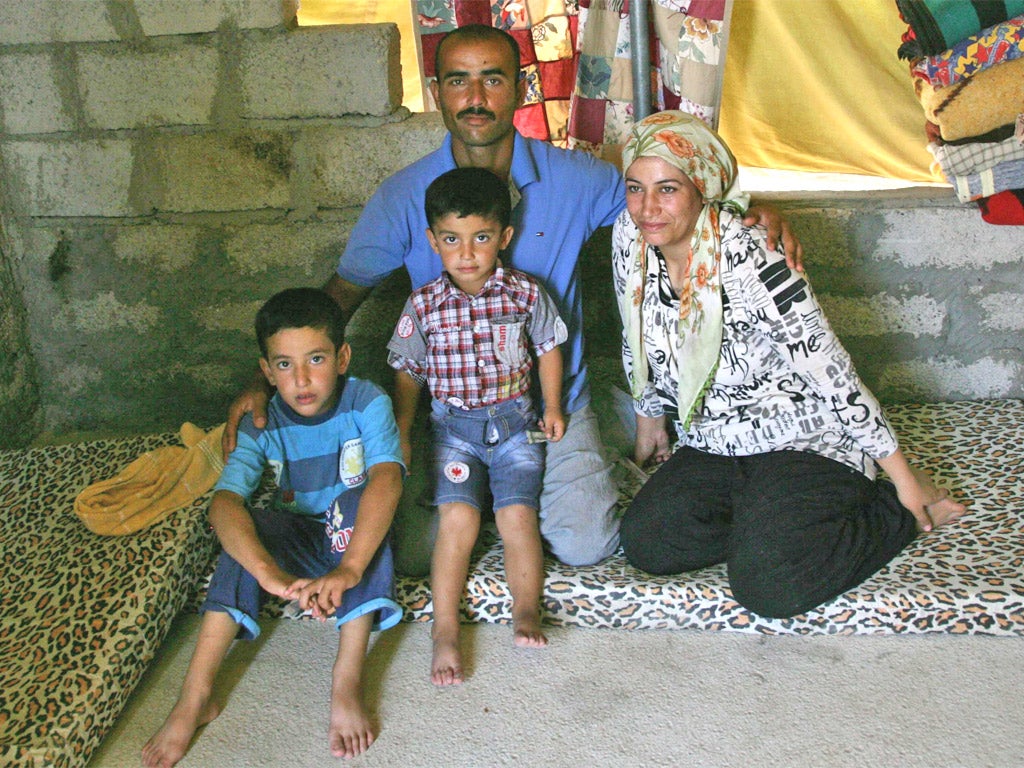The Syrian refugees who do not want to go home
Iraqi Kurdistan offers new hope to families fleeing violence and a crippled economy

Unlike most refugees fleeing the destruction of the Syrian civil war, 27-year-old Lina Mohammed says she doesn't want to go home.
Among the rows of dusty tents that stretch endlessly up the hill in the Domiz refugee camp in Iraqi Kurdistan, the Mohammed house stands out – largely because it is a house.
The family spent $3,200 [£2,000] building the modest but comfortable one-room home rigged up with electricity, air-conditioning and a satellite dish. A tree is painted on the bright blue wall that encompasses their small front yard, a yellow sun emblazoned with the word "Kurdistan" pokes out from behind it.
Whereas refugees in camps in Turkey complain that they are kept effective prisoners, Domiz is open. Lina's husband has found work as a carpenter in the local town. "I don't want to go back," she says, cradling her youngest child. "It's impossible to find work there."
The areas of Syria's Kurdish north-east have largely been spared the violence that has obliterated many of Syria's cities. Still, Niyaz Nori Mohamed, the camp manager at Domiz, says between 250 and 600 people arrive every day. There are now about 30,000, and though some come from Kurdish areas of Aleppo or had been living in Homs or Deraa, many have left their homes in areas of relative peace just across the border.
"They don't have work over there, there are no jobs," Mr Mohamed said. "The young men may come because they were asked to fight in the army or have defected, but the families, many come because of the economy."
In addition to the devastating loss of life, with the death toll now estimated to stretch to more than 36,000, the 20-month conflict has left the Syrian economy in tatters. As the country's commercial hub of Aleppo is ripped apart by fighting, and factories sit idle, nowhere in the country is immune to the economic shockwaves.
In Al Hasaka, where many rely on agriculture, poor harvests have traditionally driven Kurds to seek work in Syria's largest cities, an option now closed to them due to the violence.
With skyrocketing steel and material prices, the construction industry has ground to a halt, sending many, like Lina's husband, out of work. European Union and American sanctions are also adding to the pressure on the economy with oil exports, 95 per cent of which went to Europe, effectively halted.
"The crises have become an almost endless chain creating a sneaking feeling of despair about the ability to secure the basics of life," says Mohammed Ismail, a local politician in Al Hasaka's regional capital Qamishli.
Those fleeing complain of crippling inflation. Official figures said inflation reached 36 per cent in July as the currency weakened and analysts said the price of some everyday goods had risen much more. "A canister of cooking gas could cost you 10, 20 or 30 times higher than before because the only way of getting it is through the black market," says David Butters, an associate fellow at Chatham House in London.
The Syrian Prime Minister Wael al-Halqi estimated the conflict had cost the country $34bn, though analysts say the figure is likely much higher. While the situation at home may be dire, conditions at Domiz – designed for only 10,000 refugees – are also harsh.
Her hair wrapped in a pink headscarf, Ayesha Shaqr Omar, 33, says her husband is disabled and has lost his eyesight, as has her 14-year-old son. Her tent will provide feeble shelter when the winter sets in, and with no income and only basic handouts, she borrows money to essentials from the camp's ramshackle shops.
The local community can't begin to provide work for all those arriving, and young boys group idly in their tents. Kurdistan Regional Government (KRG) says it is concerned about the impact of the endless flow of refugees.
"We hope that this is temporary, that these people would be able to go back, but that is dependent on the international community," says the KRG's minister for foreign relations Falah Mustafa Bakir.
However, Syrian Kurds are used to hardship, having suffered years of oppression back home under the Baath Party. So, despite her struggles, Mrs Omar says she feels at home – having crossed a border, but not left her homeland. "We didn't have passports, couldn't buy houses, or speak Kurdish," she says. "We were already like refugees over there."
Subscribe to Independent Premium to bookmark this article
Want to bookmark your favourite articles and stories to read or reference later? Start your Independent Premium subscription today.

Join our commenting forum
Join thought-provoking conversations, follow other Independent readers and see their replies